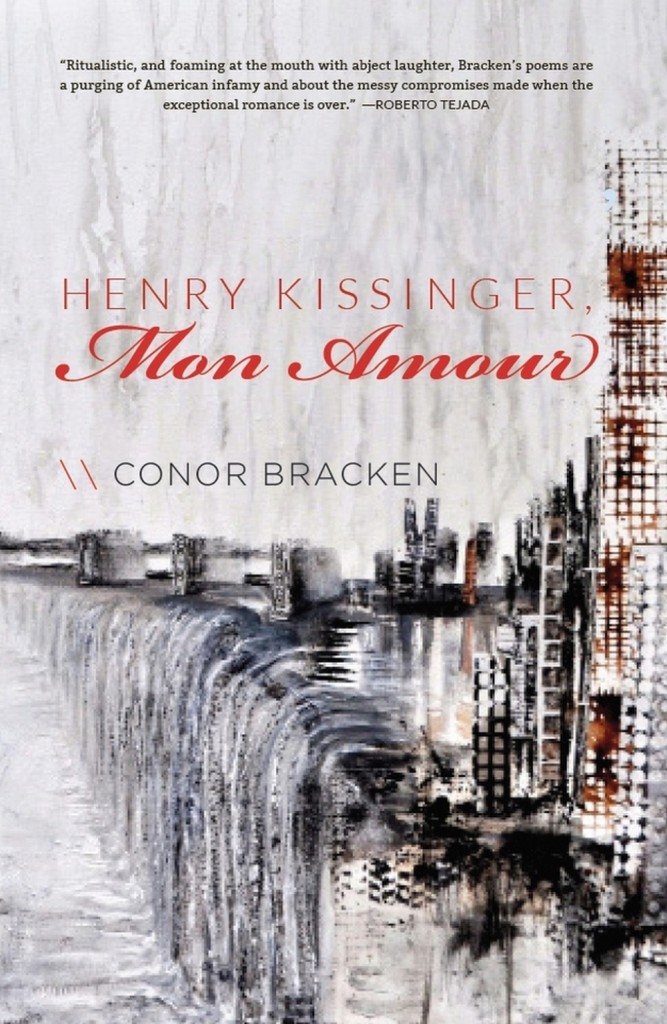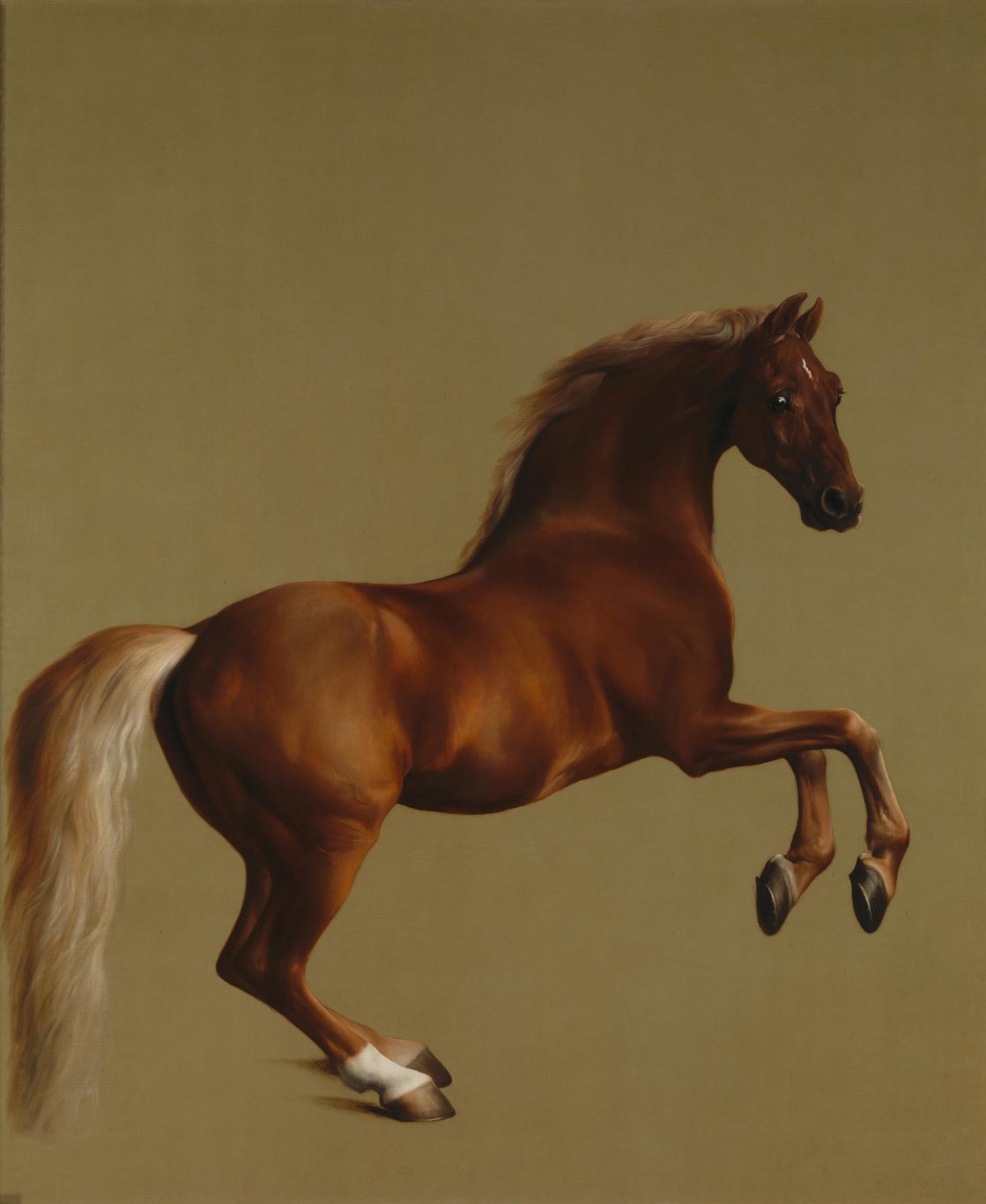On Conor Bracken’s Henry Kissinger, Mon Amour
Nick Lantz
As a historical figure, Henry Kissinger straddles a tipping point, a moment when the failures of American exceptionalism became painfully apparent to growing numbers of middle-class, white Americans. (It’s worth mentioning that those failures were apparent to others for much longer.) The dissonance between espoused American values and the often amoral realpolitik approach championed by Kissinger—first as Nixon’s National Security Advisor, then as Secretary of State—forced many Americans into an uncomfortable awareness of their own culpability in atrocities committed both at home and abroad. Though Kissinger was not the sole architect of that dissonance, he is one of its great avatars, a man of ruthless expediency and somewhat ghoulish wit. Among his more memorable bon mots is this: “The illegal we do immediately. The unconstitutional takes a little longer.” That quote appeared in the Washington Post less than a year before Nixon’s resignation. Such naked fallibility has become central to American expectations of our federal government, and it’s tempting to draw a straight line from Nixon to our current moment—not only to Trump’s daily, craven debasements of human decency, but to the continuing expansion of drone warfare under Obama, and to the consequences of the neoliberal policies of the past four decades in general. Which is to say, many Americans continue to grapple with a national ambivalence: loving one’s country while knowing it has done terrible things.
But what business does Henry Kissinger have in a book of poems? Kissinger famously quipped that “Power is the ultimate aphrodisiac,” and though this quote never explicitly appears in Conor Bracken’s remarkable chapbook, Henry Kissinger, Mon Amour, it hangs over the poems, which fuse the political and the erotic to great effect. In Bracken’s poems, desire and its enactment are repeatedly cast as images of militarized force: the heart as “a misshapen pineapple grenade,” “The body a little bomb/that pleasure sometimes lights,” and so on. “How Mercy Works” casts Kissinger as an abusive lover showering the speaker with gifts:
like the pearls that Henry gives me
when he feels bad for having needed
all the space my body takes
between him and the muzzle flash of orgasm
so badly he bruised my back or wrenched
my wrist or bloodied up this snout he rubbed
back and forth along the carpet’s nap
Here, again, we see desire likened to weaponry, transfiguring Kissinger’s body into something nonhuman and mechanical. Bracken plays repeatedly with Kissinger’s physical form and scale in this way, often rendering him as something literally larger than life, as in “Henry Pats His Heart for Emphasis”:
I’ve heard something walk around inside him
with measured steps that sound like
the distant thumps of cities being
brightly pacified
In this passage, Kissinger expands to grotesque proportions, such that his heart becomes a room in which someone paces. But then the simile enlarges him even further, imagining that interior as the landscape of a country in which cities are being bombed. There’s something dizzying in such imagery, and that effect depends on the expert way Bracken employs distance and proximity to make the reader feel unease, even horror. In the preceding passage, note how we hear footsteps from somewhere else, hear the sounds of the “distant” cities being destroyed—all far away, yet all transpiring within the intimate confines of a human body. In these poems, we zoom in and out, forced to confront violence head-on, only to be pulled back to a chilling distance. Consider the following stanzas:
Previously, on “Days of my Sphere
of Imperial Influence,” I was necking
with Henry Kissinger. We were standing
on the roof of a teetering glass building
in which two thousand companies daily outdid
each other in bilking the system that protected them
from the masses we could see from our perch
setting little fires on the serrated green horizon.
We fed each other delicacies with dirty hands—
dulce de leche under our nails, beefy
sinews between our teeth. We flossed
with the flags of every country but our own.
The passage begins in erotic intimacy, but then the eye of the poem drops down a vertigo-inducing skyscraper toward the “masses” and their “little fires” in the distance, only to retract back to the grisly close-up of food wedged under fingernails. These are the opening stanzas of “A Short History of Operation Condor,” the title referring to a decades-long program of state violence in South America, violence in which the United States colluded to further its economic interests. This poem, one of the best in the collection, embodies how Bracken uses Kissinger as a figure to both horrify and implicate the American reader.
The speaker of these poems is frequently Kissinger’s victim but is also complicit in violence enacted on others at a distance. In this way, Henry Kissinger, Mon Amour manages to capture the moral discomfort of millions of Americans who are both outraged by the worst actions of their government but also aware that their daily luxuries were purchased with such abuses. No one gets off easy here, and Bracken doesn’t offer any magical solutions, just a series of stunning, imaginative, and morally complex poems that everyone should be reading.
THE TAO OF HENRY
Spend years in one spot on the hill
so the wind cannot reclaim it,
the wind that grabs at the space in your chest
your heart gives up
then takes back
gives up then takes back.
Keep your boot on the throat of the season.
With your good eye dare the horizon to shrug.
A SHORT HISTORY OF OPERATION CONDOR
Previously, on “Days of my Sphere
of Imperial Influence” I was necking
with Henry Kissinger. We were standing
on the roof of a teetering glass
building in which two thousand companies daily outdid
each other in bilking the system that protected them
from the masses we could see from our perch
setting little fires on the serrated green horizon.
We fed each other delicacies with dirty hands—
dulce de leche under our nails, beefy
sinews between our teeth. We flossed
with the flags of every country but our own.
We bought islands we couldn’t even stripmine.
We were white and alive and in love
with the little pulse in each other’s wrist
that went give and take and give and take
and take take take take take take take. Take
my hand, said Henry. He was standing
on the grey parapet of my soul. I couldn’t tell
if the heat I felt was the chlorine he’d poured
into my ditchwater eyes or the masses
combining their cookfires. I gave him my hand
and from each of the fingers he lopped off
with a damascene machete sprang
a smaller, whiter, shrieking hand.
They latched onto his and there we were:
together, doing what I called falling.
What he called curbstomping air.
HENRY PATS HIS HEART FOR EMPHASIS
which implies he has a heart.
I wonder what it looks like.
If it swivels behind and blanches white the saw-tooth wire fence
of his bones.
If it mutters to itself at night upset
by coups planned late, worrying that it left
the serial numbers on the submachine guns.
I hold his x-rays to the moon’s blue light.
A piece of black fruit hangs left-of-center in his chest.
I’ve heard something walk around inside him
with measured steps that sound like
the distant thumps of cities being
brightly pacified
and this can’t be it
though Henry swears it must be,
that shadow like a misshapen pineapple grenade—
“Each beat is an explosion shredding
the darkness death improvises its little bombs in!”
All I see is a low-light photo of a birdcage
with a shriveled apple wired to the perch,
because I think of his body
as a kind of orchard, each thump a pear
too tumid for the wind or branch to hold.
Because to me each beat’s so sweet
it’s overripe, falling suppurating to the earth
which absolves it of its rotting
by consuming it.
But Henry thinks of his body as a region
rebelling against oblivion’s empire. A province
continually breaking away, a set of cities
in which his organs haggle over who
gets to spend tonight in the clock tower,
dragging unresisting alleyways and bridges
through the darkened hidden doorway of their rifle scope.
THE MANY OTHER CARS OF HENRY
An eagle bald and throbbing
The condom god slips off and tosses just behind him on the steam-slick bathhouse floor
A diesel-powered rebel yell
Any thumb that settles princely down inside an eye socket’s slick but vacant throne
The red horse of his voice that as it crosses all these promises off the register of silence
foams whitely at the mouth,
sand clogging up the froth
The piercing shriek a pig lets out when you ram it in the chute (which by the way he wants to pierce our tongues with
a fetid bit of terror on our breath
a whiff of death to keep our tastebuds honest)
We drive over volcanoes sinkholes
tectonic cataclysms only he can see
because he does not think in minutes hours day
he sees in eras
the mountains shrinking under their burden of air
the glass cities winds hollow and wear
like expensive bagatelles into the doldrums
he is a telescope it takes me
thousands of nanometric shifts
to aim precisely at the darkened stall of night
where I idle
gagging on the fumes
of waiting staying ready
because like Henry
to gain a millimeter on my opposition
I’d incinerate a yard
HOW MERCY WORKS
like the pearls that Henry gives me
when he feels bad for having needed
all the space my body takes
between him and the muzzle flash of orgasm
so badly he bruised my back or wrenched
my wrist or bloodied up this snout he rubbed
back and forth along the carpet’s nap
the pearls which are just a glossy crust
of FUCKs an oyster layers over
whatever grit’s got stuck inside it
a kind of beautiful pointing past weakness
or maybe it’s like this creature Henry’s trained to stagger
unsteady on its hind legs into my chambers
its pelt shampooed its balance wavering
something dangling bright and dangerous from its mouth
a platinum locket engraved with “I’m sorry
for what you made me do”
the creature whimpering like a cub
as I unthread the crimson ribbon
with which Henry delicately wired
shut its jaw
and weighting down the ribbon
a diamond ring
for this finger I broke by having
Editor’s note: We’re proud to collaborate with the Durham-based publishers Bull City Press and Backbone Press to feature work from their latest chapbooks, including Conor Bracken’s Henry Kissinger, Mon Amour, which is now available for purchase.

Conor Bracken’s poems, which have been nominated for the Best of Net and received grants from Inprint and the Squaw Valley Community of Writers, appear or are forthcoming in Adroit Journal, Forklift OH, Muzzle, The New Yorker, and THRUSH. A graduate of Virginia Tech, a former poetry editor for Gulf Coast, and the assistant director of a university writing center, he received his MFA from the University of Houston, where he and his wife currently live.





